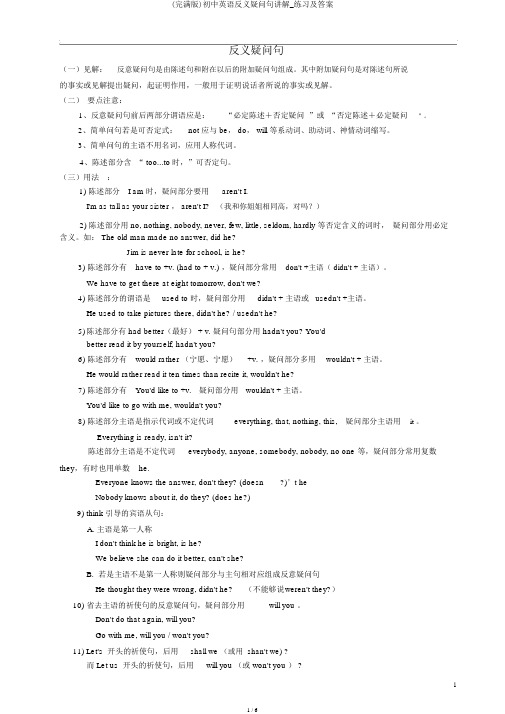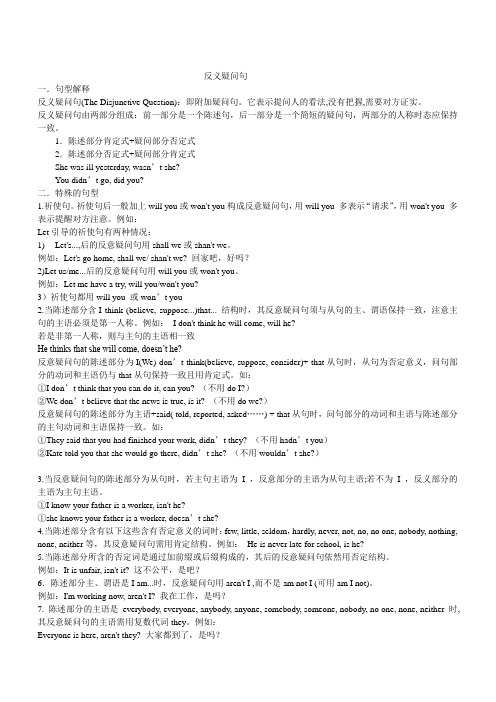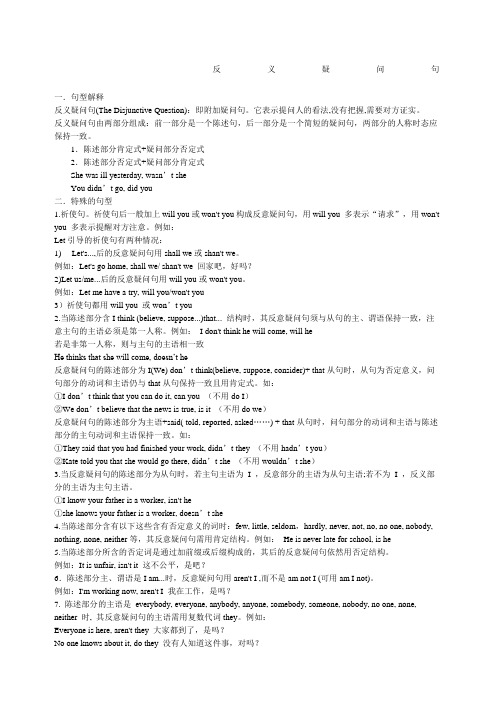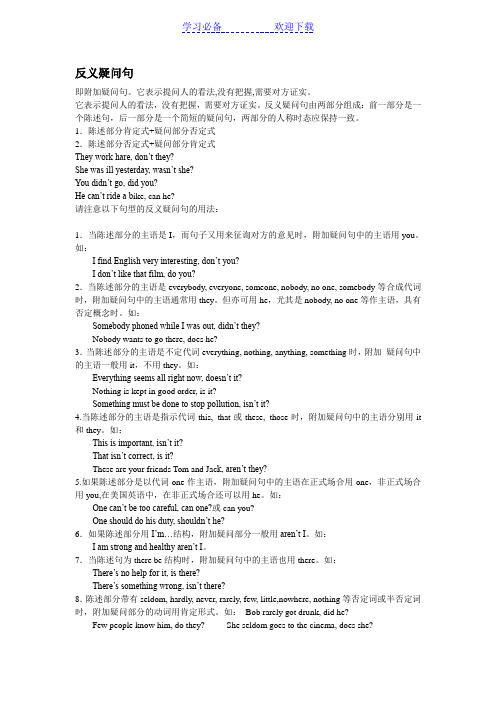初中反意疑问句讲解及练习附答案
反义疑问句详细讲解及习题及答案

反义疑问句一.句型解释反义疑问句(The Disjunctive Question):即附加疑问句。
它表示提问人的看法,没有把握,需要对方证实。
反义疑问句由两部分组成:前一部分是一个陈述句,后一部分是一个简短的疑问句,两部分的人称时态应保持一致。
1.陈述部分肯定式+疑问部分否定式2.陈述部分否定式+疑问部分肯定式She was ill yesterday, wasn’t she?You didn’t go,did you?二.特殊的句型1。
祈使句.祈使句后一般加上will you或won’t you构成反意疑问句,用will you 多表示“请求”,用won't you 多表示提醒对方注意.例如:Let引导的祈使句有两种情况:1) Let's。
.,后的反意疑问句用shall we或shan’t we。
例如:Let’s go home, shall we/ shan’t we? 回家吧,好吗?2)Let us/me。
..后的反意疑问句用will you或won't you。
例如:Let me have a try, will you/won't you?3)祈使句都用will you 或won’t you2。
当陈述部分含I think (believe, suppose..。
)that。
结构时,其反意疑问句须与从句的主、谓语保持一致,注意主句的主语必须是第一人称。
例如: I don't think he will come, will he?若是非第一人称,则与主句的主语相一致He thinks that she will come,doesn't he?反意疑问句的陈述部分为I(We) don't think(believe,suppose,consider)+ that从句时,从句为否定意义,问句部分的动词和主语仍与that从句保持一致且用肯定式.如:①I don’t think that you can do it,can you? (不用do I?)②We don’t believe that the news is true,is it? (不用do we?)反意疑问句的陈述部分为主语+said( told, reported,asked……) + that从句时,问句部分的动词和主语与陈述部分的主句动词和主语保持一致。
初中反意疑问句讲解及练习附答案

初中反意疑问句讲解及练习附答案反义疑问句一、英文中的反意疑问句。
1、什么是反意疑问句英语中,反意疑问句是由陈述句和附在其后的附加疑问句组成。
其中附加疑问句是对陈述句所说的事实或观点提出疑问,起证实作用,一般用于证实说话者所说的事实或观点。
翻译为“是吗”2.反意疑问句的回答,回答时,如果情况属实,用Yes加上反问句的倒装肯定句;若果情况不属实,则用No加上反问句的倒装否定句。
例如You were moved by your students, weren’t you? 情况属实:Yes, I were. 情况不属实:No, I weren’t.3、反意疑问句中问句部分的动词与陈述部分的动词在语气上成相反的对应关系,即:肯定+否定?否定+肯定?如:① You can’t do it, can you? 你不能做它,是吗?②They are very late for the meeting, aren’t they? 他们开会迟到了,是吗?4、当陈述句中含有be动词,助动词,或是情态动词时,反问句部分由这些词加上主语人称代词构成,Be动词包括:am, is, are, was, were助动词有:do, does, did, have(用在完成时), has(用在完成时)等情态动词有:can, could, may, might, must, will, would, shall, should例如:She is a lovely girl, isn’t she? 她是一个可爱的女孩,是吗?He will go home, __won’t__ __he__? 他要回家了,是吗?She doesn’t like to eat popcorn, __does__ _she___? 她不喜欢吃爆米花,是吗?The baby won’t sleep early, will it? 小宝宝睡得不早,是吗?注意:①He has supper at home every day, doesn’t’t he?(不能用hasn’t he?)他每天在家吃晚饭,是吗?② They have known the matter, haven’t they? (不能用don’t they?)他们已经知道那事情了,是吗?5、当陈述句中只含有行为动词时,若动词加了s,就用does, 若动词为原形,就用do,动词为过去式,则用did,例如:You cleaned your house last week, _didn’t___ __you__? 你上周打扫了你的房间,是吗?Your father plays the computer very well, __doesn’t__ ___he _? 你父亲电脑技术很好,是吗?They look so happy today, _don’t ___ _they___? 你今天看起来很高兴,是吗?6、反意疑问句的陈述部分带有little, few, never, hardly, seldom,nobody, nothing,barely, scarcely等否定意义的词时,问句部分用肯定式。
(完整版)初中英语反义疑问句讲解_练习及答案

反义疑问句(一)见解:反意疑问句是由陈述句和附在以后的附加疑问句组成。
其中附加疑问句是对陈述句所说的事实或见解提出疑问,起证明作用,一般用于证明说话者所说的事实或见解。
(二)要点注意:1、反意疑问句前后两部分谓语应是:“必定陈述+否定疑问”或“否定陈述+必定疑问”。
2、简单问句若是可否定式:not 应与 be, do, will 等系动词、助动词、神情动词缩写。
3、简单问句的主语不用名词,应用人称代词。
4、陈述部分含“ too...to时,”可否定句。
(三)用法:1) 陈述部分I am 时,疑问部分要用aren't I.I'm as tall as your sister , aren't I?(我和你姐姐相同高,对吗?)2) 陈述部分用 no, nothing, nobody, never, few, little, seldom, hardly 等否定含义的词时,疑问部分用必定含义。
如: The old man made no answer, did he?Jim is never late for school, is he?3) 陈述部分有have to +v. (had to + v.) ,疑问部分常用don't +主语( didn't + 主语)。
We have to get there at eight tomorrow, don't we?4) 陈述部分的谓语是used to 时,疑问部分用didn't + 主语或usedn't +主语。
He used to take pictures there, didn't he? / usedn't he?5)陈述部分有 had better(最好) + v. 疑问句部分用 hadn't you? You'dbetter read it by yourself, hadn't you?6) 陈述部分有would rather (宁愿、宁愿)+v. ,疑问部分多用wouldn't + 主语。
(完整版)反义疑问句详细讲解及习题及答案

反义疑问句一.句型解释反义疑问句(The Disjunctive Question):即附加疑问句。
它表示提问人的看法,没有把握,需要对方证实。
反义疑问句由两部分组成:前一部分是一个陈述句,后一部分是一个简短的疑问句,两部分的人称时态应保持一致。
1.陈述部分肯定式+疑问部分否定式2.陈述部分否定式+疑问部分肯定式She was ill yesterday, wasn’t she?You didn’t go, did you?二.特殊的句型1.祈使句。
祈使句后一般加上will you或won't you构成反意疑问句,用will you 多表示“请求”,用won't you 多表示提醒对方注意。
例如:Let引导的祈使句有两种情况:1) Let's...,后的反意疑问句用shall we或shan't we。
例如:Let's go home, shall we/ shan't we? 回家吧,好吗?2)Let us/me...后的反意疑问句用will you或won't you。
例如:Let me have a try, will you/won't you?3)祈使句都用will you 或won’t you2.当陈述部分含I think (believe, suppose...)that... 结构时,其反意疑问句须与从句的主、谓语保持一致,注意主句的主语必须是第一人称。
例如:I don't think he will come, will he?若是非第一人称,则与主句的主语相一致He thinks that she will come, doesn’t he?反意疑问句的陈述部分为I(We) don’t think(believe, suppose, consider)+ that从句时,从句为否定意义,问句部分的动词和主语仍与that从句保持一致且用肯定式。
反义疑问句详细讲解及习题及答案

反义疑问句一.句型解释反义疑问句(The Disjunctive Question):即附加疑问句。
它表示提问人的看法,没有把握,需要对方证实。
反义疑问句由两部分组成:前一部分是一个陈述句,后一部分是一个简短的疑问句,两部分的人称时态应保持一致。
1.陈述部分肯定式+疑问部分否定式2.陈述部分否定式+疑问部分肯定式She was ill yesterday, wasn’t sheYou didn’t go, did you二.特殊的句型1.祈使句。
祈使句后一般加上will you或won't you构成反意疑问句,用will you 多表示“请求”,用won't you 多表示提醒对方注意。
例如:Let引导的祈使句有两种情况:1) Let's...,后的反意疑问句用shall we或shan't we。
例如:Let's go home, shall we/ shan't we 回家吧,好吗?2)Let us/me...后的反意疑问句用will you或won't you。
例如:Let me have a try, will you/won't you3)祈使句都用will you 或won’t you2.当陈述部分含I think (believe, suppose...)that... 结构时,其反意疑问句须与从句的主、谓语保持一致,注意主句的主语必须是第一人称。
例如:I don't think he will come, will he若是非第一人称,则与主句的主语相一致He thinks that she will come, doesn’t he反意疑问句的陈述部分为I(We) don’t think(believe, suppose, consider)+ that从句时,从句为否定意义,问句部分的动词和主语仍与that从句保持一致且用肯定式。
(完整版)反义疑问句详细讲解及习题及答案

反义疑问句一.句型解释反义疑问句(The Disjunctive Question):即附加疑问句。
它表示提问人的看法,没有把握,需要对方证实。
反义疑问句由两部分组成:前一部分是一个陈述句,后一部分是一个简短的疑问句,两部分的人称时态应保持一致。
1.陈述部分肯定式+疑问部分否定式2.陈述部分否定式+疑问部分肯定式She was ill yesterday, wasn’t she?You didn’t go, did you?二.特殊的句型1.祈使句。
祈使句后一般加上will you或won't you构成反意疑问句,用will you 多表示“请求”,用won't you 多表示提醒对方注意。
例如:Let引导的祈使句有两种情况:1) Let's...,后的反意疑问句用shall we或shan't we。
例如:Let's go home, shall we/ shan't we? 回家吧,好吗?2)Let us/me...后的反意疑问句用will you或won't you。
例如:Let me have a try, will you/won't you?3)祈使句都用will you 或won’t you2.当陈述部分含I think (believe, suppose...)that... 结构时,其反意疑问句须与从句的主、谓语保持一致,注意主句的主语必须是第一人称。
例如:I don't think he will come, will he?若是非第一人称,则与主句的主语相一致He thinks that she will come, doesn’t he?反意疑问句的陈述部分为I(We) don’t think(believe, suppose, consider)+ that从句时,从句为否定意义,问句部分的动词和主语仍与that从句保持一致且用肯定式。
初中反义疑问句详解及练习和答案

反义疑问句即附加疑问句。
它表示提问人的看法,没有把握,需要对方证实。
它表示提问人的看法,没有把握,需要对方证实。
反义疑问句由两部分组成:前一部分是一个陈述句,后一部分是一个简短的疑问句,两部分的人称时态应保持一致。
1.陈述部分肯定式+疑问部分否定式2.陈述部分否定式+疑问部分肯定式They work hare, don’t they?She was ill yesterday, wasn’t she?You didn’t go, did you?He can’t ride a b ike, can he?请注意以下句型的反义疑问句的用法:1.当陈述部分的主语是I,而句子又用来征询对方的意见时,附加疑问句中的主语用you。
如:I find English very interesting, don’t you?I don’t like that film, do you?2.当陈述部分的主语是everybody, everyone, someone, nobody, no one, somebody等合成代词时,附加疑问句中的主语通常用they。
但亦可用he,尤其是nobody, no one等作主语,具有否定概念时。
如:Somebody phoned while I was out, didn’t they?Nobody wants to go there, does he?3.当陈述部分的主语是不定代词everything, nothing, anything, something时,附加疑问句中的主语一般用it,不用they。
如:Everything seems all right now, doesn’t it?Nothing is kept in good order, is it?Something must be done to stop pollution, isn’t it?4.当陈述部分的主语是指示代词this, that或these, those时,附加疑问句中的主语分别用it 和they。
初中反义疑问句详解及练习和答案

反义疑问句即附加疑问句。
它表示提问人的看法,没有把握,需要对方证实。
它表示提问人的看法,没有把握,需要对方证实。
反义疑问句由两部分组成:前一部分是一个陈述句,后一部分是一个简短的疑问句,两部分的人称时态应保持一致。
1.陈述部分肯定式+疑问部分否定式2.陈述部分否定式+疑问部分肯定式They work hare, don’t they?She was ill yesterday, wasn’t she?You didn’t go, did you?He can’t ride a b ike, can he?请注意以下句型的反义疑问句的用法:1.当陈述部分的主语是I,而句子又用来征询对方的意见时,附加疑问句中的主语用you。
如:I find English very interesting, don’t you?I don’t like that film, do you?2.当陈述部分的主语是everybody, everyone, someone, nobody, no one, somebody等合成代词时,附加疑问句中的主语通常用they。
但亦可用he,尤其是nobody, no one等作主语,具有否定概念时。
如:Somebody phoned while I was out, didn’t they?Nobody wants to go there, does he?3.当陈述部分的主语是不定代词everything, nothing, anything, something时,附加疑问句中的主语一般用it,不用they。
如:Everything seems all right now, doesn’t it?Nothing is kept in good order, is it?Something must be done to stop pollution, isn’t it?4.当陈述部分的主语是指示代词this, that或these, those时,附加疑问句中的主语分别用it 和they。
- 1、下载文档前请自行甄别文档内容的完整性,平台不提供额外的编辑、内容补充、找答案等附加服务。
- 2、"仅部分预览"的文档,不可在线预览部分如存在完整性等问题,可反馈申请退款(可完整预览的文档不适用该条件!)。
- 3、如文档侵犯您的权益,请联系客服反馈,我们会尽快为您处理(人工客服工作时间:9:00-18:30)。
反义疑问句一、英文中的反意疑问句。
1、什么是反意疑问句英语中,反意疑问句是由陈述句和附在其后的附加疑问句组成。
其中附加疑问句是对陈述句所说的事实或观点提出疑问,起证实作用,一般用于证实说话者所说的事实或观点。
翻译为“是吗”2.反意疑问句的回答,回答时,如果情况属实,用Yes加上反问句的倒装肯定句;若果情况不属实,则用No加上反问句的倒装否定句。
例如 You were moved by your students, weren’t you? 情况属实:Yes, I were. 情况不属实:No, I weren’t.3、反意疑问句中问句部分的动词与陈述部分的动词在语气上成相反的对应关系,即:肯定+否定?否定+肯定?如:① You can’t do it, can you? 你不能做它,是吗?②They are very late for the meeting, aren’t they? 他们开会迟到了,是吗?4、当陈述句中含有be动词,助动词,或是情态动词时,反问句部分由这些词加上主语人称代词构成,Be动词包括:am, is, are, was, were助动词有:do, does, did, have(用在完成时), has(用在完成时)等情态动词有:can, could, may, might, must, will, would, shall, should例如:She is a lovely girl, isn’t she? 她是一个可爱的女孩,是吗?He will go home, __won’t__ __he__? 他要回家了,是吗?She doesn’t like to eat popcorn, __does__ _she___? 她不喜欢吃爆米花,是吗?The baby won’t sleep early, will it? 小宝宝睡得不早,是吗?注意:①He has supper at home every day, doesn’t’t he? (不能用hasn’t he?)他每天在家吃晚饭,是吗?② They have known the matter, haven’t they? (不能用don’t they?)他们已经知道那事情了,是吗?5、当陈述句中只含有行为动词时,若动词加了s,就用does, 若动词为原形,就用do,动词为过去式,则用did,例如:You cleaned your house last week, _didn’t___ __you__? 你上周打扫了你的房间,是吗?Your father plays the computer very well, __doesn’t__ ___he _? 你父亲电脑技术很好,是吗?They look so happy today, _don’t ___ _they___? 你今天看起来很高兴,是吗?6、反意疑问句的陈述部分带有little, few, never, hardly, seldom,nobody, nothing,barely, scarcely等否定意义的词时,问句部分用肯定式。
如:①She never tells a lie, does she?(不用doesn’t she?) 她从不说谎,是吗?②He was seldom late, was he?(不用wasn’t he?)他几乎不迟到,是吗?7、反意疑问句的陈述部分为I am……时,问句部分习惯上用aren’t I?表示。
如: I am a very honest man, aren’t I?我是个很诚实的人,是吗?8.陈述部分的主语为不定代词something, anything, nothing, everything时,问句部分的主语用it。
如:①Something is wrong with the computer, isn’t it? 电脑有问题了,是吗?②Nothing has happened to them, has it?他们什么事也没发生,是吗?9、陈述部分的主语为不定代词somebody (someone), anybody (anyone), nobody (no one), everybody (everyone)时,问句部分的主语用he 或 they,这时问句动词的数应和he或 they一致。
如:①Someone has taken the seat, hasn’t he? 有人已经坐了位置,是吗?②Everyone has done their best in the game, haven’t they? 每个人在比赛中已经尽力了,是吗?10.陈述部分为祈使句1)若为let’s引导,反问句用shall we? 例如Let’s go home together, shall we? 让我们一起回家,好吗?2)若为let us引导和其余的任何一般的否定祈使句,都用will you, 例如 Let us stop to rest, will you? 让我们停下休息,好吗?Don’t make any noise, will you? 别弄出噪音,好吗?3)一般的肯定祈使句则用will you 或won’t you 都行,例如: Do sit down, won’t you?/ will you? 请坐,好吗? You feed the bird today, will you? 今天你喂鸟,是吗?Please open the window, will you? (won’t you?) 打开窗,好吗?11:陈述部分为There (Here) + be + 主语时,问句部分用动词+there (here)?形式。
①There are two cakes on the plate, aren’t there? 碟子里有两块蛋糕,是吗?②Here is a story about Mark Twain, isn’t here? 这是关于马克吐温的故事,是吗?反意疑问句练习1. You’d rather watch TV this evening, ______?a. isn’t itb. hadn’t youc. wouldn’t youd. won’t you2. I suppose you’re not going today, ______?a. are youb. do youc. don’t youd. aren’t you3. I wish to shake hands with you, ______? a. shall b. may I c. do I d. will I4. Three hours ought to be enough time, ______?a. oughtn’t three hoursb. didn’t theyc. shouldn’t itd. shouldn’t three hours5. They have to study a lot, ______?a. don’t theyb. haven’t theyc. did theyd. hadn’t they6. When the car crashed, your brother escaped being hurt, ______ ?a. didn’t heb. did hec. did itd. didn’t it7. I'm sure dirty, ______? a. am I b. isn’t I c. aren’t I d. am not I8. You seem to be dissatisfied with your present post. I don’t think you judged yo ur ability objectively when you applied for it, ______ you? a. do b. did c. don’t d. didn’t9. That’s the sort of the book you want, ______? a. is it d. isn’t that c. is that d. isn’t it10. All these dictionaries are a great help to you, ______?a. are theyb. aren’t theyc. are all these dictionariesd. aren’t all these dictionaries11.The movie that we saw last week was quite interesting, ______?a. wasn’t itb. was itc. didn’t wed. weren’t we12.Tom has been writing letters all afternoon, but he should have finished them by now, ______?a. hasn’t heb. has hec. shouldn’t hed. didn’t you13.David told me that you would take a trip to America, ______?a. would youb. wouldn’t youc. did youd. didn’t you14.There appeared to be no better way, _______?a. was thereb. were therec. did thered. didn’t there15. You has some trouble finding where I live, ______?a. didn’t youb. hadn’t youc. do Id. don’t I16.He has his hair cut every month, ______? a. has he b. hasn’t he c. does he d. doesn’t he17.Your friend needs to come earlier, ______? a. does he b. doesn’t he c. need he d. needn’t he18.The little boy dare not go to church, ______? a. dare he b. daren’t he c. does he d. doesn’t he19. Susan’d have worked abroad if she’d had the chance, ______?a. has sheb. hadn’t shec. would shed. wouldn’t she20. Everyone’s having a good time, ______?a. is heb. isn’t every onec. does hed. aren’t they21.Any one can join the club, ______?a. can any oneb. can’t any onec. can’t theyd. can they22.Tell me how to operate the electronic computer, ______?a. will youb. shan’t youc. do youd. don’t you23.Magaret scarcely comes to visit you on Christmas Day, ______?a. doesn’t sheb. does shec. do youd. don’t you24. Let’s listen to the radio program that the teacher mentioned, ______?a. do web. don’t wec. shall wed. shan’t we25.You think you’re funny, ______? a. didn’t you b. are you c. don’t you d. do you26.Janet used to take part in labor in that village, ______?a. used sheb. did shec. didn’t shed. should she27.What beautiful weather, ______? a. is it b. isn’t it c. won’t it d. doesn’t it28. He ought to go to Kwangchow by plane, ______?a. should heb. shouldn’t hec. would hed. wouldn’t he29. We never dared to ask him a question, ______?a. did web. didn’t wec. dared wed. daren’t we30. Nobody will believe how difficult his work has been ______?a. will heb. won’t nobodyc. will theyd. won’t they31.You must have made the mistake, ______?a. mustn’t youb. haven’t youc. didn’t youd. hadn’t you32.Learning how to repair computers takes a long time, ______?a. isn’t itb. aren’t theyc. doesn’t itd. don’t they33.Jack has coffee with breakfast, ______?a. hasn’t Jackb. hasn’t hec. doesn’t Jackd. doe sn’t he34.They must have stayed at hotel last night, ______?a. mustn’t theyb. haven’t theyc. didn’t theyd. hadn’t they35.There isn’t anything wrong with the radio, ______?a. is thereb. is itc. does itd. does there36.You must be hungry, ______?a. must youb. mustn’t youc. are youd. aren’t you37.Let’s do the exercises by ourselves, ______?a. shall web. shan’t wec. will youd. will we38.Her daughter had the carpets and curtains cleaned, ______?a. had sheb. hadn’t shec. didn’t shed. didn’t her daughter39.The teacher had a talk with you, ______?a. has youb. hadn’t shec. did shed. didn’t she40.Something’ll have to be done about the air pollution, ______?a. won’t i tb. will itc. has itd. does it41. Linda ate nothing this morning, ___? A. didn’t she B. was she C. did she D. wasn’t she42. There’s hardly___ milk in the bottle, _____there? A. no, isn’t B. some, is C. little, isn’t D. any, is43. He has n ever ridden a horse before, ___? A. does he B. has he C. hasn’t he D. doesn’t he44. — He seldom came here, _____? —Yes sir. A. didn’t he B. does he C. doesn’t he D. did he45. Everything seems all right, _____ ? A. does it B. don’t they C. won’t it D. doesn’t it46. Nobody was absent from the meeting, ____ ? A. was it B. were they C. wasn’t he D. weren’t they47. One can’t be too modest, can _____ ? A. one B. he C. it D. we48. No one failed in the exam, _____ ? A. was he B. did one C. did they D. didn’t he49. I’m a little late for class, _____ I? A. amn’t B. am not C. isn’t D. ain’t50. Neither you nor I am a artist, _____ ? A. am I B. aren’t we C. are we D. ain’t I51. He can’t be her father, _____ he? A. is B. isn’t C. can D. can’t答案1 C2 A3 B4 C5 A6 A7 C8 B9 D 10 B 11 A 12 C 13 B 14 D 15 A 16 D 17 B 18 A 19 D 20 D 21 C 22 A 23 B24 C25 D26 C 27 B28 B 29 A 30 C 31 B 32 C33 D34 C35 A36 D37 A 38 C 39 D 40 A41 C 42 D 43 B 44 D 45 D 46 B 47 A 48 C 49 D 50 C 51 A。
